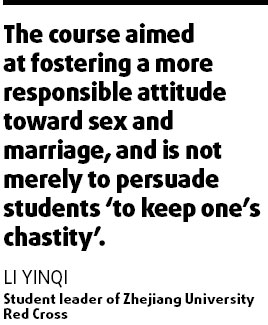The morning after
|
Premarital sex is a topic that triggers heated discussion in China. Chen Fan |
A young man invites a girl to his home: "Lily, would you like to come to my home to study?" and throws in a bait, "My parents are there." But when the girl arrives, she finds the boy's parents are not at home.
This is a scene from a skit playing at a training course in Zhejiang University.
What does the girl do next?
It is a question aimed at urging all the students attending the course to abstain from premarital sex.
"We have no idea what to do in such a situation where no third person is present," says Xiao Jin after watching the show. "Maybe such role play can help us avoid some 'mistakes'."
The main focus of this training program, for which around 200 students signed up, is to convince students to abstain from sex before marriage and foster "a sense of responsibility", says the organizer Li Yinqi, a student leader of Zhejiang University Red Cross.
Instead of listening to lectures, students at the two-day training course participate in group discussions and games. They watch videos and engage in role play, all aimed at the same message of no sex before marriage.
Li says the two-day training course encourages students to discuss the consequences of premarital sex and also tries to raise awareness about AIDS. "The course aimed at fostering a more responsible attitude toward sex and marriage, and is not merely to persuade students 'to keep one's chastity'."
Responding to the course, a second-year student surnamed Qin says, "What we received earlier was a wealth of knowledge about AIDS - from the basic facts to prevention and treatment to anti-discrimination. But what is even more important is one's attitude to sex and love."

China has seen revolutionary changes in the past decades, says Shanghai University sociology professor Gu Jun. Many changes have been positive, such as the progress in independent rights for women. But some changes have been negative, such as the attitude toward sex, which sees chastity as outdated and premarital sex as normal and even beneficial. Premarital sex is winning more adherents, he adds.
"Nowadays, it is not uncommon to see a bride well-advanced in pregnancy at a wedding. Some may see it as social progress, but I'm not sure," says Xiao Yu, a third-year student at Fudan University in Shanghai.
Another student Deng Min, 22, too thinks, "Premarital sex is not good for young people, for they don't have the capacity to withstand its impact either physiologically or psychologically. Besides, it can create many problems that have a negative effect on sexual feeling and marital life."
Premarital sex is an issue that is closely related to social conventions and a society's cultural ethos. In this sense, it is not merely a matter of private choice but has wider social significance.
However, not everyone agrees with the sex-after-marriage campaign. For example, office clerk Zhang Yue says, "Such a course confuses responsible sex with unsafe and irresponsible sex." There are those who argue that such a training course represents an outdated view of sex and believe it goes against youngsters' natural right to have sex.
College student Lin Lin, 24, feels, "It conveys a conservative, even outdated, message to young people. College students and other young people are adults who have their sexual needs. As long as they understand their responsibilities, they should be allowed to make their own personal choices."
The liberation of sexuality from moral constraints has brought in its wake a host of problems - venereal diseases, AIDS, drug abuse, unwanted pregnancies, teen moms, besides psychological and interpersonal problems.
A report released by the United Nations Population Fund in 2006 shows that worldwide, 6,000 people aged 15 to 24 get infected with HIV each day; meanwhile, only one out of five young people have access to AIDS-related information.
In China, where more than 220,000 HIV infected cases were reported by the end of September 2007, with 55,000 having developed AIDS, knowledge of the disease is rather sketchy.
Despite efforts to reduce the incidence of AIDS and other related diseases, the idea of abstinence from sex is not popular with today's youngsters.
Even college teacher Xiao Zhang, 32, says, "Educating young people to abstain from sex before marriage will only make them more curious and even obsessed with it. It is very natural for some college students to try sex. They should learn about responsibility and protection when having sex."
Shi Daiqiang, an AIDS expert, advocates a practical approach. "What we can do now is to encourage safe and responsible sex, rather than prohibiting it."

Researchers have pointed out two common problems encountered in AIDS-education efforts. The education is not practical, and teachers are reluctant to mention words like "sex" or "condom", which are essential to instruction about safe behaviors.
Supporters of Zhejiang University's "chastity training course" feel it serves as an important counterweight to the wave of "sexual liberty" that has changed many youngsters' attitude to sex in recent years.
Office clerk Liu Zheng, 27, says, "Many serious problems have arisen from the growing trend of having sex at increasingly younger ages in recent years. These youngsters often lack an adequate understanding of what they are doing and what the consequences will be. If college students voluntarily signed up for the course, they probably wanted to learn something about sex."
Striking a similar note, Shanghai resident Xiao Wang, 23, argues that, "The threat of AIDS and other sexually transmitted diseases is real. Such courses help young people protect themselves. It doesn't just discourage premarital sex but teaches students about responsible and safe sex."
(China Daily 05/15/2008 page20)















